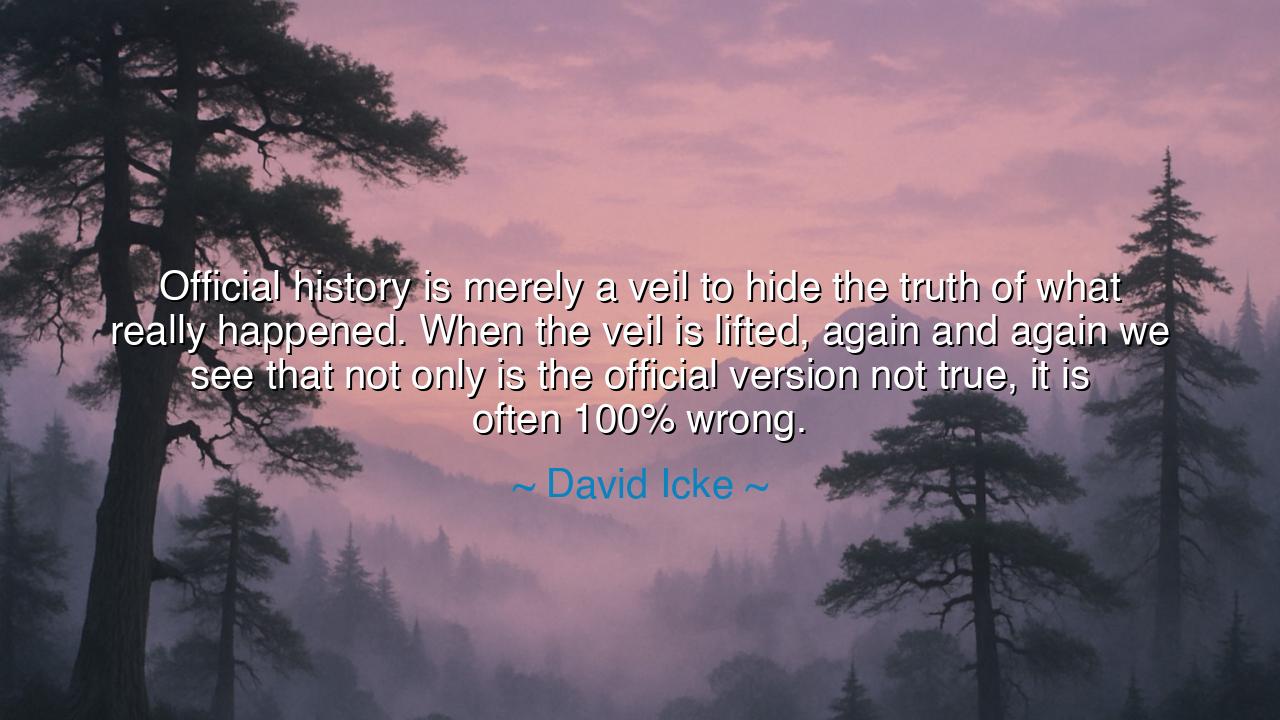
Official history is merely a veil to hide the truth of what
Official history is merely a veil to hide the truth of what really happened. When the veil is lifted, again and again we see that not only is the official version not true, it is often 100% wrong.






“Official history is merely a veil to hide the truth of what really happened. When the veil is lifted, again and again we see that not only is the official version not true, it is often 100% wrong.” – David Icke
In these piercing words, David Icke speaks not merely of history as a record of the past, but of power, truth, and the eternal struggle between the rulers and the ruled. His warning is ancient in spirit and modern in voice: that what we are told to believe about the world — the polished stories written in textbooks, the tales told by victors, the doctrines carved into monuments — are often veils, woven to conceal the raw and uncomfortable truth. Beneath these veils, Icke says, lies the deeper reality of human affairs: that behind every empire’s grandeur are chains; behind every “heroic” conquest, rivers of blood; behind every “official truth,” the silence of those never permitted to speak.
The origin of this quote rests in Icke’s lifelong confrontation with systems of control — political, economic, and informational. Once a journalist and broadcaster, he became disillusioned with the ways in which the powerful manipulate public perception through what he calls “official narratives.” Though his ideas often court controversy, his underlying message echoes the timeless wisdom of those who dared to question the stories of kings, priests, and governments. He reminds us that “official history” — the kind sanctioned by those in authority — is rarely neutral. It is shaped, edited, and purified to serve the needs of power, not the cause of truth. To believe it blindly is to mistake the storyteller for the story itself.
This truth is as old as civilization. The ancient scribes of Egypt carved the victories of Pharaohs upon temple walls, but the defeats — the rebellions, the famines, the failures — were erased from stone, as if silence could make them vanish. Centuries later, Roman historians glorified the empire’s expansion, yet few recorded the suffering of the conquered. Even in modern times, the victors of war have written the history of nations, while the defeated are left voiceless beneath the rubble of their ruined cities. Thus, history becomes not the memory of mankind, but the mythology of the powerful. Icke’s words tear at that illusion, calling us to lift the veil — to see the past not as it was presented, but as it was lived.
Consider, for instance, the long deception surrounding the Tuskegee Syphilis Experiment in the United States. For forty years, from 1932 to 1972, hundreds of Black men were told they were receiving treatment for a disease, when in truth they were deliberately denied care so scientists could observe the natural course of illness. The “official story” claimed benevolence and progress. The truth — uncovered decades later — was one of exploitation and cruelty. Here, the veil of authority was torn, revealing the rot beneath the facade of respectability. It is one of countless reminders that the institutions we trust to preserve truth often distort it to protect themselves.
When Icke says the official version is not only false but “100% wrong,” he speaks not as a historian but as a seer of patterns. His words reflect a moral vision — that those who control information can make reality itself seem different. When newspapers, governments, or even scholars align their stories, truth becomes not what is real, but what is permitted to be known. And yet, as he declares, the veil cannot remain forever. Time, like light, has a way of piercing through fabrications. Every generation lifts a corner of the curtain, discovering anew that what it was taught is not what truly was.
But Icke’s message is not merely accusation; it is a summons — a call to awaken the mind of discernment. He asks us to become seekers, not believers. To question, to examine, to compare, to doubt — not as cynics, but as lovers of truth. The wise of every age have spoken this same counsel. Socrates taught that wisdom begins in knowing one’s ignorance. Voltaire warned that those who can make us believe absurdities can make us commit atrocities. Icke stands in this lineage of rebels against illusion, urging us to reclaim our eyes from the spell of “officialdom.”
So, my child of curiosity and conscience, take this teaching as a flame against the darkness: never accept the first story you are told, especially when told by power. Seek the hidden voices beneath the noise — the forgotten, the silenced, the defeated — for in their words you may find the truth that history tried to bury. Read not only the scrolls of kings, but the songs of peasants. Question every inscription carved in stone, for every monument is also a mask.
For in the end, as David Icke reminds us, truth is never given — it must be sought. The veil of official history will always return, woven anew by each generation of rulers. But so long as there are minds brave enough to lift it, hearts strong enough to face what lies beneath, and voices willing to speak what others fear to hear, humanity will not remain blind. Lift the veil, child of the future — and in doing so, you will see not only the crimes and misfortunes of the past, but the shining possibility of a world built at last upon truth.






AAdministratorAdministrator
Welcome, honored guests. Please leave a comment, we will respond soon